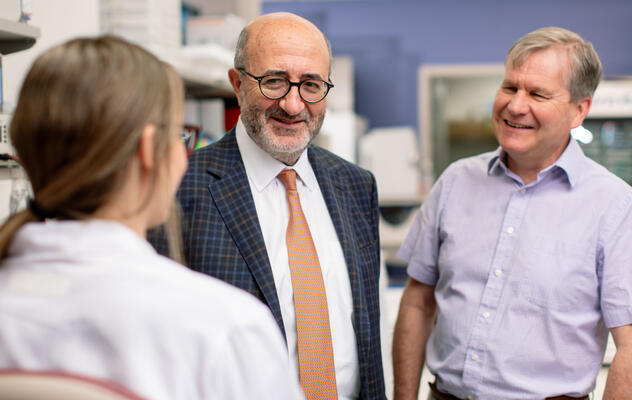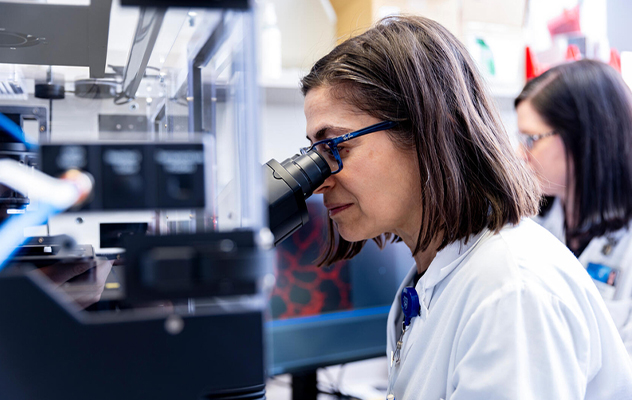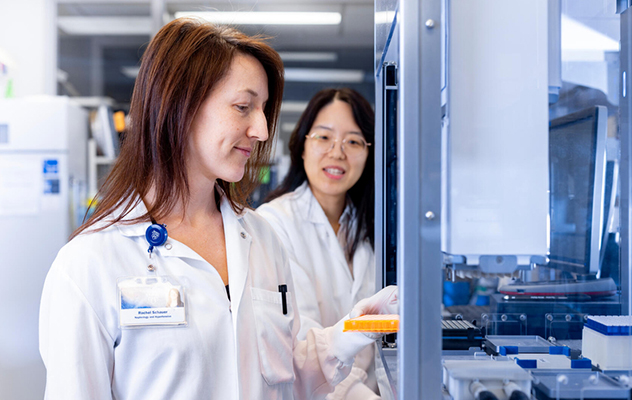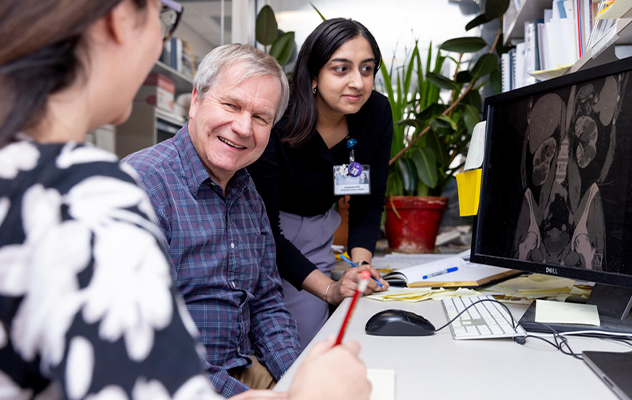-

Forging new ground
As leaders of the center, Dr. Torres, middle, and Dr. Harris, right, set the foundation for a positive research culture that maximizes scientific discovery in kidney disease.
-

Advancing promising therapies
Our investigators have made many novel and important contributions to PKD research, with a first therapy now available after clinical studies.
-

Encouraging collaboration
Our commitment to a team approach along with robust funding and education opportunities helps drive research findings from lab to bedside faster.
-

Supporting investigators
Our researchers have access to state-of-the-art technical resources and services, including imaging analysis, model systems and genetic screening.
Overview
The Mayo Clinic Robert M. and Billie Kelley Pirnie Translational Polycystic Kidney Disease Center focuses on translating basic scientific findings into new and better treatments for people with polycystic kidney disease (PKD).
In the past two decades, researchers at Mayo Clinic and around the world have made great strides in understanding the fundamental genetic and biological mechanisms that contribute to the etiology and pathogenesis of polycystic kidney disease.
The Mayo Clinic Pirnie Translational Polycystic Kidney Disease Center has played a central role in this rich history and continues to forge new ground in PKD research.
The center and its three core facilities focus research efforts on the type of PKD called autosomal dominant polycystic kidney disease (ADPKD), which mainly affects adults. The center extends Mayo Clinic's strong tradition of PKD-related basic, translational and clinical research. Mayo Clinic investigators have made many novel and important contributions to the understanding and characterization of polycystic kidney disease through the years. These findings have moved into preclinical and clinical trials, with the first therapy now available.
Research in the Mayo Clinic Pirnie Translational Polycystic Kidney Disease Center is collaborative and multidisciplinary. PKD investigators work alongside Mayo Clinic clinicians and scientists with expertise in such fields as imaging, physiology, gastroenterology, molecular biology and genomics. This team approach means that promising therapies move more quickly from the lab through clinical trials and into clinical practice to benefit people with PKD and related disorders — conditions that can have devastating and life-threatening complications.
Core services
The center has three core facilities that provide both Mayo Clinic investigators and external investigators with access to state-of-the-art technical resources and services. These cores help with understanding the genetic basis of disease, monitoring disease progression more accurately and improving prognostics. They also provide researchers with model systems to explore disease pathogenesis and conduct preclinical testing.
The center's efforts are further enhanced by the availability of significant Mayo Clinic resources, including the Center for Clinical and Translational Science (CCaTS) and many institutional core resources.
Center directors
The director of the Mayo Clinic Pirnie Translational Polycystic Kidney Disease Center is Peter C. Harris, Ph.D., and the associate director is Vicente E. Torres, M.D., Ph.D.
- Dr. Harris is a professor of biochemistry and molecular biology and a professor of medicine at Mayo Clinic College of Medicine and Science in Rochester, Minnesota. Dr. Harris is also principal investigator of the Polycystic Kidney Disease Discovery Laboratory, where he investigates molecular events associated with tubule formation with a focus on polycystic kidney disease and related conditions. Read more about Dr. Harris.
- Dr. Torres is a nephrologist at Mayo Clinic in Rochester, Minnesota, and a professor of medicine at Mayo Clinic College of Medicine and Science. Dr. Torres focuses his research on improving treatment options for PKD. He has published extensively on the epidemiology, phenotypic characterization, natural history and clinical management of PKD and related diseases and has contributed to the identification of responsible genes and the expression and function of encoded proteins. Read more about Dr. Torres.
The center is supported by a robust leadership team of PKD experts, ensuring a strong commitment to research that ultimately improves outcomes for people affected by these conditions.
Funding
The Mayo Clinic Robert M. and Billie Kelley Pirnie Translational Polycystic Kidney Disease Center was established in 2010. The center is funded by a generous gift from Robert M. and Billie Kelley Pirnie and a Congressionally Directed Medical Research Discovery Award from the U.S. Department of Defense.